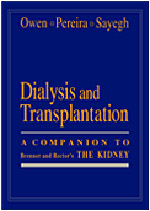A. PRINCIPLES AND PRACTICE OF HEMODIALYSIS
1. Priciples of Hemodialysis
2. Biocompatibility of Hemodialysis Membranes: From the
Laboratory to the Clinic
3. The Hemodialysis Prescription - Dosing and Adequacy
4. Vascular Access
5. Reprocessing of Hemodialyzers
B. PRINCIPLES AND PRACTICES OF PERITONEAL DIALYSIS
6. Peritoneal Membrane Biology
7. Peritoneal Transport - Clinical Implications
8. Peritoneal Dialysis Prescription - Dosing & Adequacy
9. Management of PD Infections
10. Conventional and Newer PD Solutions
C. LONG-TERM CARE OF THE DIALYSIS PATIENT
11. Intra-dialytic Complications
12. Cardiovascular Disease and high Blood Pressure
13. Dialysis Related Amyloidosis
14. Dialysis-related osteoarthropathies
15. Achieving an Optimum Hematocrit
16. Management of the Diabetic ESRD Patient
17. Dialysis in Children
18. Noscomial Infections in Hemodialysis Units - Strategies for
Control
19. Drug Dosing in Dialysis Patients
20. Algorithms for Quality Assurance
D. RENAL REPLACEMENT THERAPY IN THE CRITICALLY ILL
21. Selection of Dialysis Modality
22. Dopamine/ANP/Growth Factors
23. Extracorporeal Treatment of Poisoning
E. ETHICAL AND ECONOMIC ISSUES
24. Legal and Ethical Issues of Dialysis
F. KIDNEY TRANSPLANTATION
25. Transplantation Immunobiology
26. Current Results and Determinants of Graft Outcome in Kidney
Transplation
27. Donor and Recipient Evaluation
28. Surgical Aspects of Kidney Transplantation
29. Induction Immunosupressive Therapy
30. Current and Emerging Maintenance Immunosuppressive Therapy
31. Diagnosis and Therapy of Graft Dysfunction
32. Post-transplant Infections
33. Medical Complications of Kidney Transplantation
34. Recurrent and de novo Renal Disease in Kidney
Transplantation
35. Pediatric Kidney Transplantation
36. Will Xenotransplantation Become a Clinical Reality?


